Climate change is no longer a distant threat—it is a lived reality for millions across India. Rising temperatures, shifting rainfall patterns, and extreme weather events are reshaping landscapes, disrupting livelihoods, and challenging India’s development journey. As the world’s most populous country with diverse geographies, India stands on the frontline of the climate crisis.
Rising Temperatures and Heatwaves
India has been witnessing record-breaking heatwaves in recent years. According to climate scientists, average temperatures are projected to rise by 1.5–2°C by mid-century, with northern and central India among the hardest hit. Prolonged heat spells not only threaten human health but also reduce agricultural productivity, strain energy demand, and intensify water shortages.
Agriculture Under Stress
Agriculture remains the backbone of India’s economy, employing nearly half of the population. Climate change disrupts this sector in multiple ways:
- Unpredictable monsoons: Rainfall is becoming erratic, with floods in some regions and droughts in others.
- Declining yields: Heat stress affects staple crops like wheat and rice, threatening food security.
- Pest outbreaks: Changing weather conditions create favorable environments for pests and diseases.
Small and marginal farmers, who form the majority, are particularly vulnerable as they lack resources to adapt quickly.
Water Insecurity
India faces a looming water crisis. Glaciers in the Himalayas, the source of major rivers like the Ganga and Brahmaputra, are retreating due to warming. Groundwater—the lifeline for irrigation and drinking water—is being depleted faster than it can be replenished. Rising sea levels also threaten freshwater supplies in coastal regions with saltwater intrusion.
Extreme Weather Events
Climate change has amplified the frequency and intensity of cyclones, floods, and droughts:
- Cyclones like Amphan, Yaas, and Remal have devastated eastern coasts.
- Floods in Kerala, Assam, and Bihar displace millions annually.
- Prolonged droughts in Maharashtra and Rajasthan push rural communities into distress migration.
The economic cost is staggering, with damages running into billions of dollars every year.
Public Health Concerns
Rising temperatures and changing ecosystems increase the risk of vector-borne diseases like malaria and dengue. Heat stress leads to more hospitalizations, especially among the elderly and urban poor. Air pollution—already a pressing issue—is worsened by climate-related factors such as wildfires and dust storms.
Coastal Vulnerability
With over 7,500 km of coastline, India is highly exposed to sea level rise. Cities like Mumbai, Chennai, and Kolkata face the risk of partial submergence in the coming decades. Coastal erosion, saltwater intrusion, and damage to infrastructure put millions at risk, particularly fishing and farming communities.
Social and Economic Impacts
Climate change deepens existing inequalities. Women, children, and marginalized groups often bear the heaviest burdens. Migration due to crop failure or disasters fuels urban overcrowding and unemployment. India’s GDP is projected to face significant losses if adaptation measures are not scaled up.
Pathways to Resilience
Despite these challenges, India is also a hub of climate action and innovation:
- Expanding renewable energy capacity (targeting 500 GW by 2030).
- Investing in climate-resilient agriculture and water-saving technologies.
- Promoting nature-based solutions like mangrove restoration and afforestation.
- Strengthening early warning systems and disaster preparedness.
Global cooperation, finance, and technology transfer will be crucial in supporting India’s transition to a sustainable and resilient future.
Conclusion
The impacts of climate change on India are profound and multifaceted. From farmers in Punjab to fishermen in Kerala, millions are grappling with a changing climate every day. Yet, with its vast potential for renewable energy, resilient communities, and a growing awareness of sustainability, India also has the opportunity to lead the way in building a climate-secure future.
🌍 The choices India makes today will not only shape its own destiny but also contribute significantly to the global fight against climate change.

